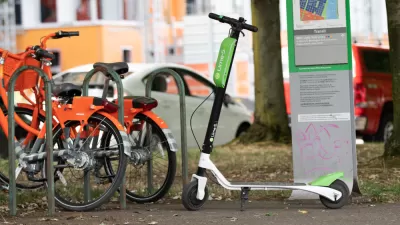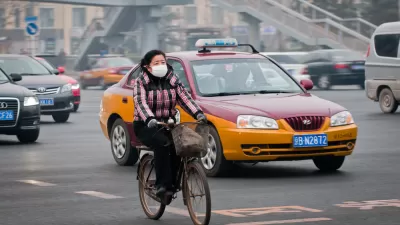Matthew Stevenson anticipates the end of the bicycle in China's major cities, now overrun with scooters and scrambling for Western status symbols – in spite of ever-worsening traffic.
In the midst of their near-overnight metamorphosis, cities in China are struggling to make sense of the tug-of-war between old and new ways of living. Increasingly, the experience of exploring these metropolises by bicycle is deeply emblematic of the older generation's losing battle.
Even just a few years ago, as Stevenson puts it, "Beijing was delightful by bike." But facing cultural pressures for status symbols and luxury, Chinese youth have lost their taste for the humble, utilitarian two-wheeler: "With a single gear and heavy steel frame, the [national standard model] is ideal for long rides on flat city streets. At a cost of US $180, it is the bike bargain of the world. Nevertheless, the dream for younger Chinese is a Honda scooter."
Riding a bicycle in Beijing still comes with certain privileges – dedicated lanes, exclusive rights-of-way, special parking spaces at train stations, and of course the convenience of being able to percolate through gridlocked traffic. But in an environment of ever more unenforceable traffic, cars and scooters encroach further and further on cyclists' territory, making cycling more nerve-wracking than delightful. Stevenson describes his observations during a recent tour through the capital:
"After a while, I had my eyes attuned to the demographics of bike riders. They tended to be school kids or the elderly. From this blacktop survey, I judged that middle-aged or prosperous Beijingers have little appetite for riding. Most were moving around on scooters, the kind that have clogged many Asian cities."
FULL STORY: The Beijing Bicycle: A Requiem

Alabama: Trump Terminates Settlements for Black Communities Harmed By Raw Sewage
Trump deemed the landmark civil rights agreement “illegal DEI and environmental justice policy.”

Study: Maui’s Plan to Convert Vacation Rentals to Long-Term Housing Could Cause Nearly $1 Billion Economic Loss
The plan would reduce visitor accommodation by 25% resulting in 1,900 jobs lost.

Planetizen Federal Action Tracker
A weekly monitor of how Trump’s orders and actions are impacting planners and planning in America.

Wind Energy on the Rise Despite Federal Policy Reversal
The Trump administration is revoking federal support for renewable energy, but demand for new projects continues unabated.

Passengers Flock to Caltrain After Electrification
The new electric trains are running faster and more reliably, leading to strong ridership growth on the Bay Area rail system.

Texas Churches Rally Behind ‘Yes in God’s Back Yard’ Legislation
Religious leaders want the state to reduce zoning regulations to streamline leasing church-owned land to housing developers.
Urban Design for Planners 1: Software Tools
This six-course series explores essential urban design concepts using open source software and equips planners with the tools they need to participate fully in the urban design process.
Planning for Universal Design
Learn the tools for implementing Universal Design in planning regulations.
Caltrans
Smith Gee Studio
Institute for Housing and Urban Development Studies (IHS)
City of Grandview
Harvard GSD Executive Education
Toledo-Lucas County Plan Commissions
Salt Lake City
NYU Wagner Graduate School of Public Service





























